Global Action Week for Education GAWE 2023
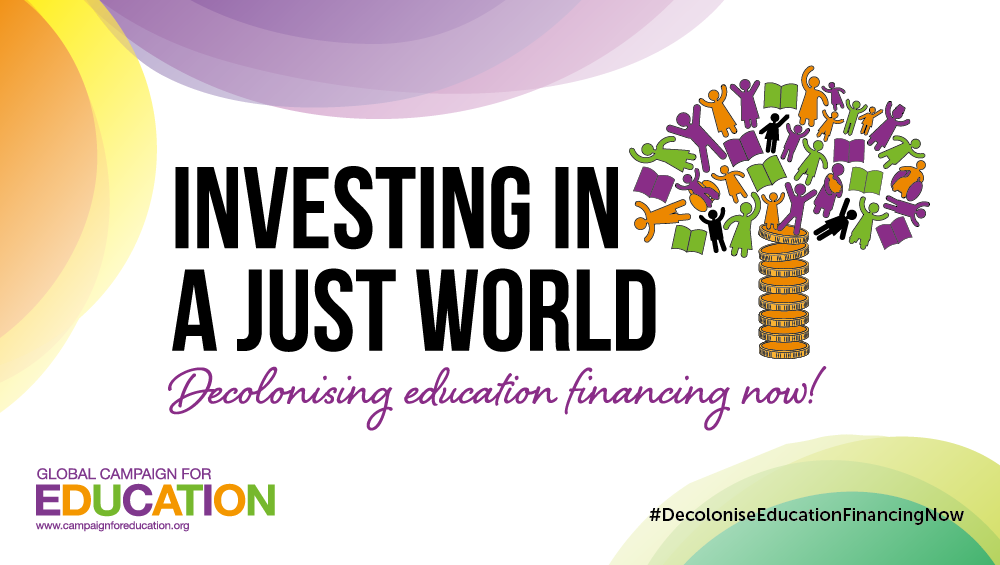
Investing in a Just World: Decolonising Education Financing Now!
Act Now!
#DecoloniseEducationFinancingNow #GAWE2023 #20yearsGAWE
TAKE PART in Global Action Week for Education, May 29 - June 2, 2023.
Global Action Week for Education (GAWE) is one of the most important events for the education movement worldwide. The #GAWE2023 is celebrated annually, and in this edition, the campaign completes 20 years, embracing the slogan "Investing in a Just World: Decolonising Education Financing Now!". GAWE 2023 will be held between 29 May - 2 June with a special call to the governments to comply with the Transformative Education Summit Call to Action on Financing agreed by the Heads of State gathered in September 2022 in the mentioned Summit.
The estimation of the annual education-financing gap in low and lower middle-income countries is $148 billion. Additional costs due to COVID19 related school closures risk increasing this financing gap by up to one third, or between US$30-45 billion. In this context, there is an urgent need for civil society to demand a massive scaling up of financing, ensuring that it is accountable and reaches the most marginalized and that these resources are used to strengthen free public education systems for the benefit of all. In that sense, with global tax abuse estimated at $483 billion, tax justice must be a priority for ensuring sufficient and adequate resources for education.
For making pression towards a transformative and decolonising agenda for education financing, the GAWE 2023 amplify the voices of the educational communities, activists and social organizations and movements, to demand:
- ACTION ON TAX: to increase tax-to-Gross National Product (GDP) ratios through progressive tax reforms. And change how global rules are set!
- ACTION ON AUSTERITY: urge the International Monetary Fund (IMF), the World Bank and other international financial institutions to remove existing austerity measures, recommendations and obstacles such as public sector wage constraints that discourage increased spending on teacher salaries; and champion policies that will increase the attractiveness of the profession and allow significant new recruitment of professional teachers wherever there are shortages.
- ACTION ON DEBT: countries spending more in debt servicing than on education should be front of queue for debt cancellation or renegotiations. New mechanisms on debt are needed!
- ACTION ON PARADIGMS: it is necessary that Ministries of Finance see education as investment not consumption.
- ACTION ON SPECIAL DRAWING RIGHTS: we demand a new issuing of the IMF currency as was done during Covid19, and the just redistribution of these resources.
The education financing gaps and what we defend to address this context
It is evident that education has been chronically underfunded and that countless countries cannot allocate the budget required by their education systems or give education the financial priority it demands. In view of the growing privatization, commercialisation and commodification in and of education, education systems are becoming increasingly inequitable, deepening broader economic exclusion, which threatens progress towards free quality public education for all. The financing of education is increasingly being passed on to families and households, and this is the most regressive way of financing education. It excludes those who can't afford it, leading to violations of human rights, and exacerbating social inequalities.
The Sustainable Development Goal (SDG) 4, related to the right to education, will not be realized by 2030 without a significant and well-targeted increase in financing, particularly in those countries furthest from achieving quality education for all at all levels.
Therefore, the adherence to the international and regional benchmarks of allocating efficiently at least 4 - 6% of Gross Domestic Product (GNP) and/or at least 15 - 20% of total public expenditure to education is very urgent. International standards also call on developed countries to achieve the target of 0.7 per cent of GNP for Official Development Assistance (ODA) to developing countries.
We also need to increase the 4 Ss:
- The Share of national budgets dedicated to education (at least 15-20%),
- The Size of government budgets overall (determined by tax, debt, macro-policies, trade etc),
- The Sensitivity of education budget allocations – driven by an evidence-based approach toequity and efficiency,
- The Scrutiny of education spending in practice – so citizens can participate in the budget definition and monitoring processes, resources are tracked especially in the most disadvantaged communities, data quality is improved and the capacity to use data is enhanced.
What we defend as decolonising education financing
Decolonising education financing means changing the power dynamics between national governments and international donors, lenders and financial institutions - making sure national governments, in consultation with their citizens, are in the driving seat of shaping education reforms. The biggest blocks to expanding financing on education are in the international financial systems that perpetuate a colonial relationship of extraction and control. Whilst aid can still play a role, it should not shape the agenda and it needs to be properly harmonised and aligned. A decolonial mindset also rejects the supremacy of Western philosophies and eurocentric modalities of being and knowing in the world, and argues that knowledge production is tied to local and concrete struggles, thus it favors analyses, art forms, and actions that are particular to contexts and begin from the ground up.
On the other hand, the dominance of neo-colonial frameworks, histories, and knowledge systems, perpetuate power structures that carry legacies of racism, xenophobia, patriarchy and imperialism. There have been calls to decolonize the education, the academy, the curricula and pedagogies because, unfortunately, the production, dissemination and application of knowledge, continue to promote oppressive patterns. The current education systems’ enduring complicity with coloniality neglect the validity and applicability of traditional and diverse knowledge systems, including those whose perspectives are often marginalised. In that sense, it is crucial that we deconstruct colonial influences in education spaces, and identify what sort of education is being financed!
Our communication pack
We are thrilled to share with you the #GAWE2023 Campaign pack with everything you need to take part in this important week of mobilisation. This includes:
The #GAWE2023 logo (available in Arabic, English, French, Portuguese, Spanish).
The #GAWE2023 concept note (available in Arabic, English, French, Portuguese, Spanish).
The #GAWE2023 Social Media Toolkit with suggested Social Media Posts.
The #GAWE2023 Political statement for dissemination.
The #GAWE2023 Press release for dissemination.
Participate!
Organise an event in your country to demand urgent action to Decolonise Education Financing Now! Share your plans with GCE Secretariat ahead of #GAWE2023 to explore the different ways GCE can support you!
TAKE PART and strengthen actions!
As a preparative and formative moment for GAWE2023, GCE organised two key events: The Global Lessons on Education and the #GAWE2023 Workshop. The events were scheduled for May 2 and 4 at 2 p.m. SAST.
The events provided invaluable insights on decolonising education financing and tax justice and outlined collectively owned preparatory steps for actions around #GAWE2023.
Watch The Global Lessons videos HERE
Take action!
Would you like to take part in this campaign? Here are the 5 ways through which how you can participate:
- Sign our CALL TO ACTION demands for governments and the international community.
- Access and share our communication materials.
- Organise conversations and activities in your school, college, neighbourhood or community to reflect on education funding, or join the campaign agenda in your country.
- Use our letter templates to present demands to the Ministries of Education and Finance, and representatives of global financial institutions in your country.
- Join our virtual dialogues on decolonising education financing.
Save the date to take part in our policy virtual dialogues!
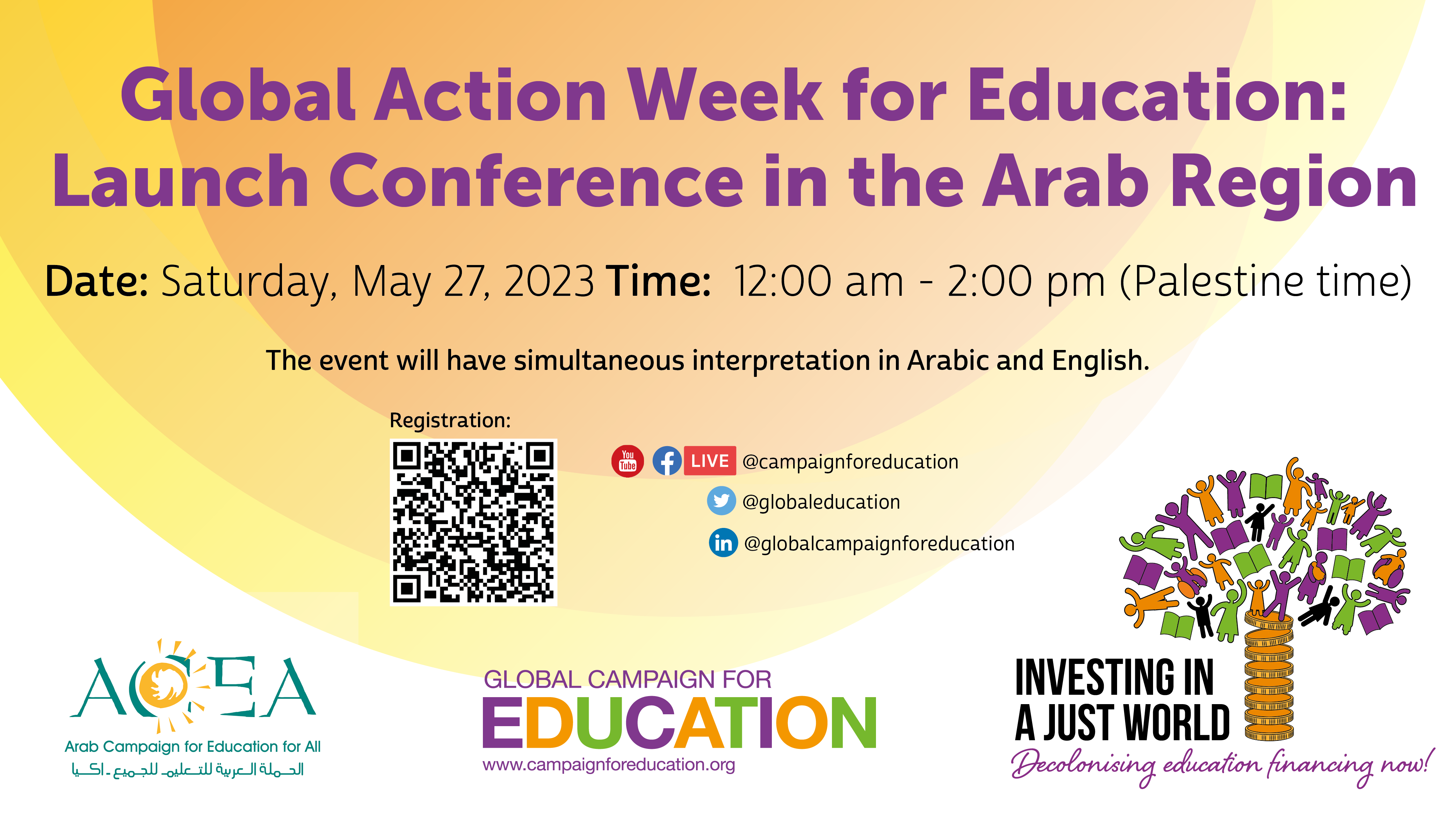
Global Action Week for Education: Launch Conference in the Arab Region
Date: Saturday, May 27, 2023
Time: 12:00 am - 2:00 pm (Palestine time)
Languages: The event will have simultaneous interpretation in Arabic and English.
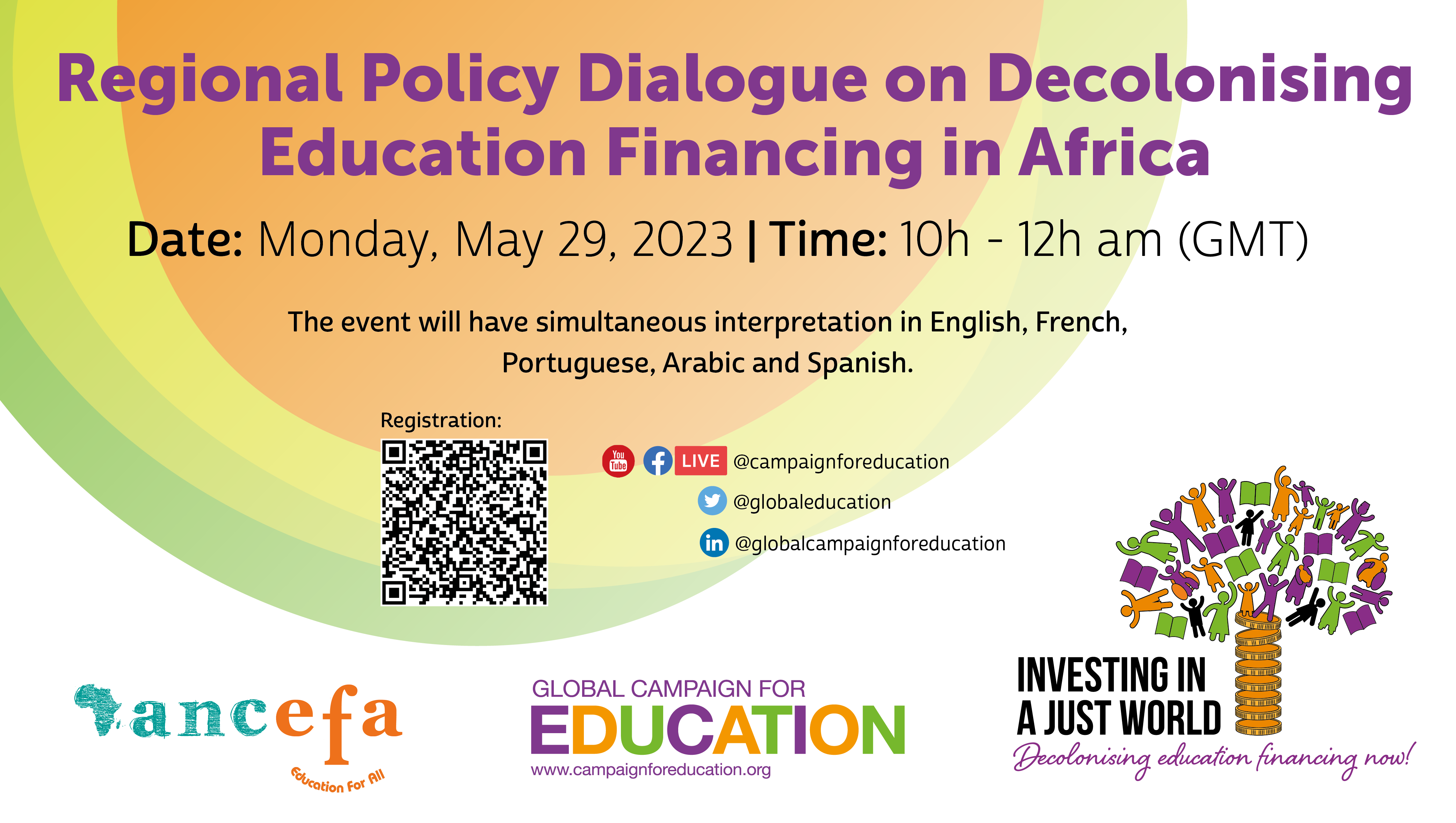
Regional Policy Dialogue on Decolonising Education Financing in Africa
Date: Monday, May 29, 2023
Time: 10h - 12h am (GMT)
Languages: The event will have simultaneous interpretation in English, French, Portuguese, Arabic and Spanish.
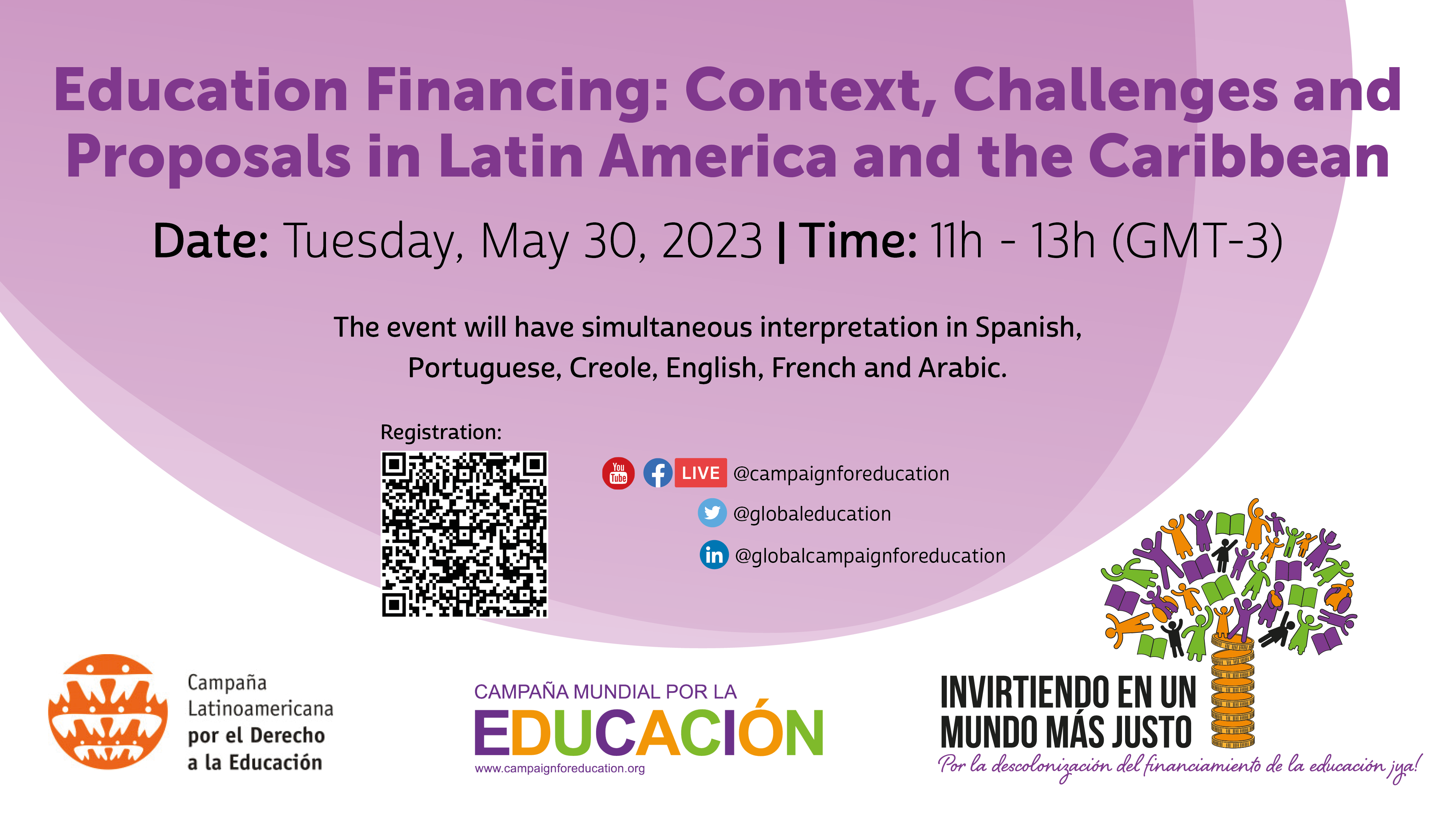
Policy dialogue of Latin America and the Caribbean (CLADE).
🗓️ Date: Tuesday, May 30, 2023
🕛 Time: 11h - 13h (GMT-3)
🔗 Registration: https://bit.ly/3onoBnT
🧏 The event will have simultaneous interpretation in Spanish, Portuguese, Creole, English, French and Arabic.
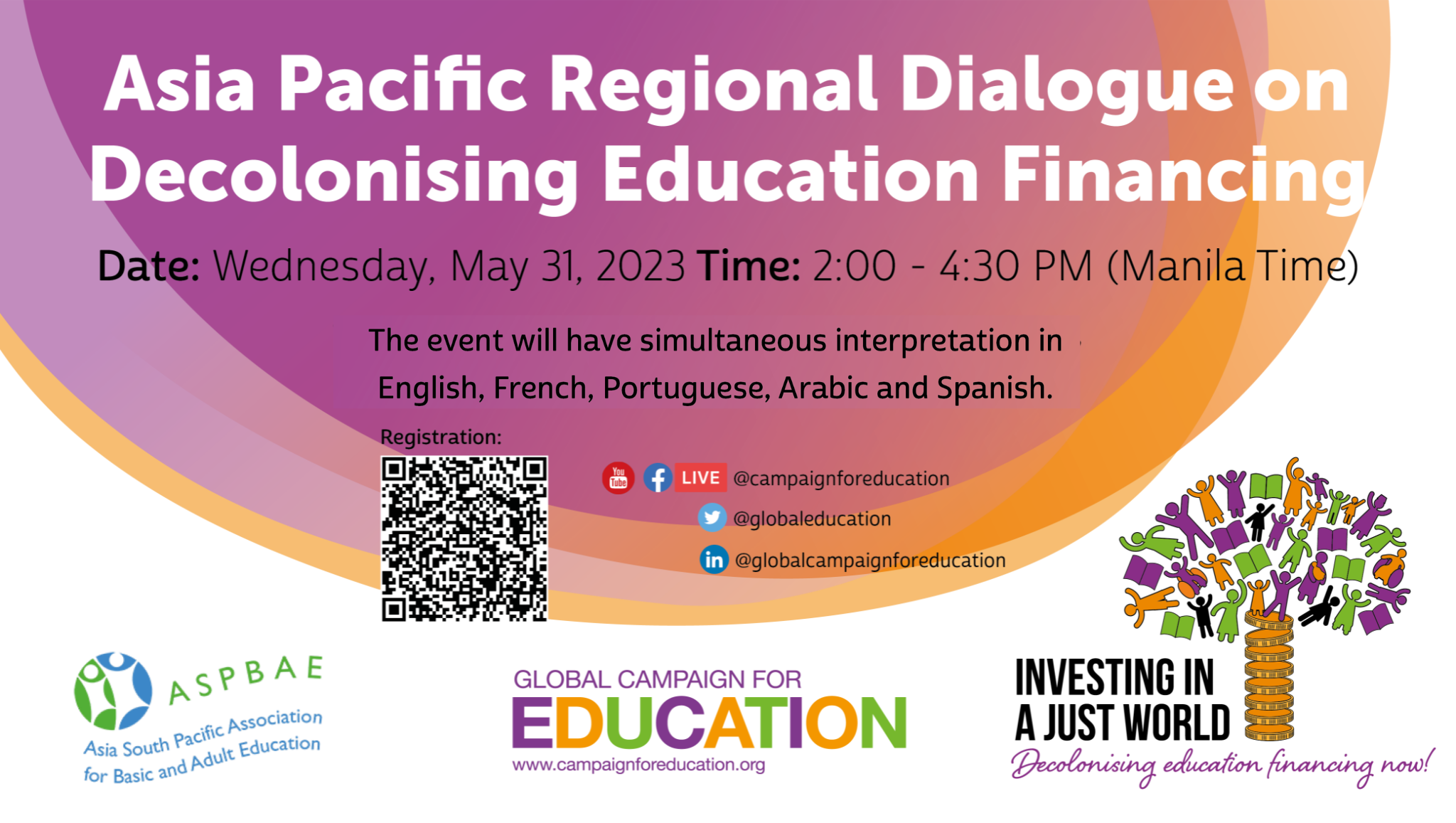
Policy dialogue of Asia and South-Pacific (ASPBAE)
🗓️ Date: May 31, 2023
🕛 Time: 2:00 - 4:30 PM (Manila Time)
🔗 Registration: https://bit.ly/438ThIC
🧏 The event will have simultaneous interpretation in English, French, Portuguese, Arabic and Spanish.

May 31 - Youth and Students Global Event.
🗓️ Date: May 31, 2023
🕛 Time: 14h30 - 16h00 (SAST)
🔗 Registration: https://bit.ly/43h8tD4
🧏 The event will have simultaneous interpretation in English, French, Portuguese, Arabic and Spanish.
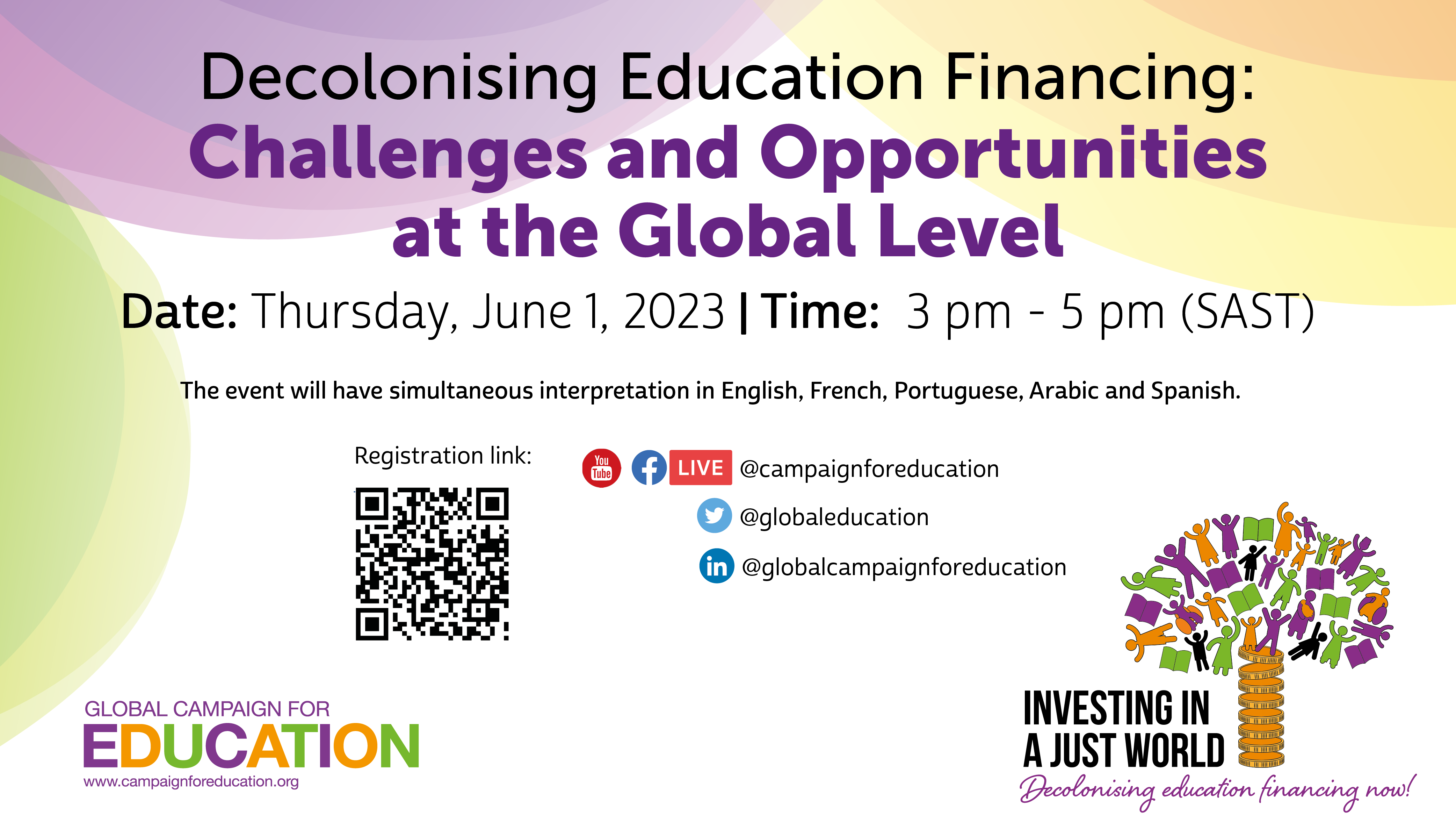
June 1 - Global High Level Event.
🗓️ Date: Thursday, June 1, 2023
🕛 Time: 3 pm - 5 pm (SAST)
🔗 Registration: https://bit.ly/globaleventGAWE2023
🧏 The event will have simultaneous interpretation in English, French, Portuguese, Arabic and Spanish.
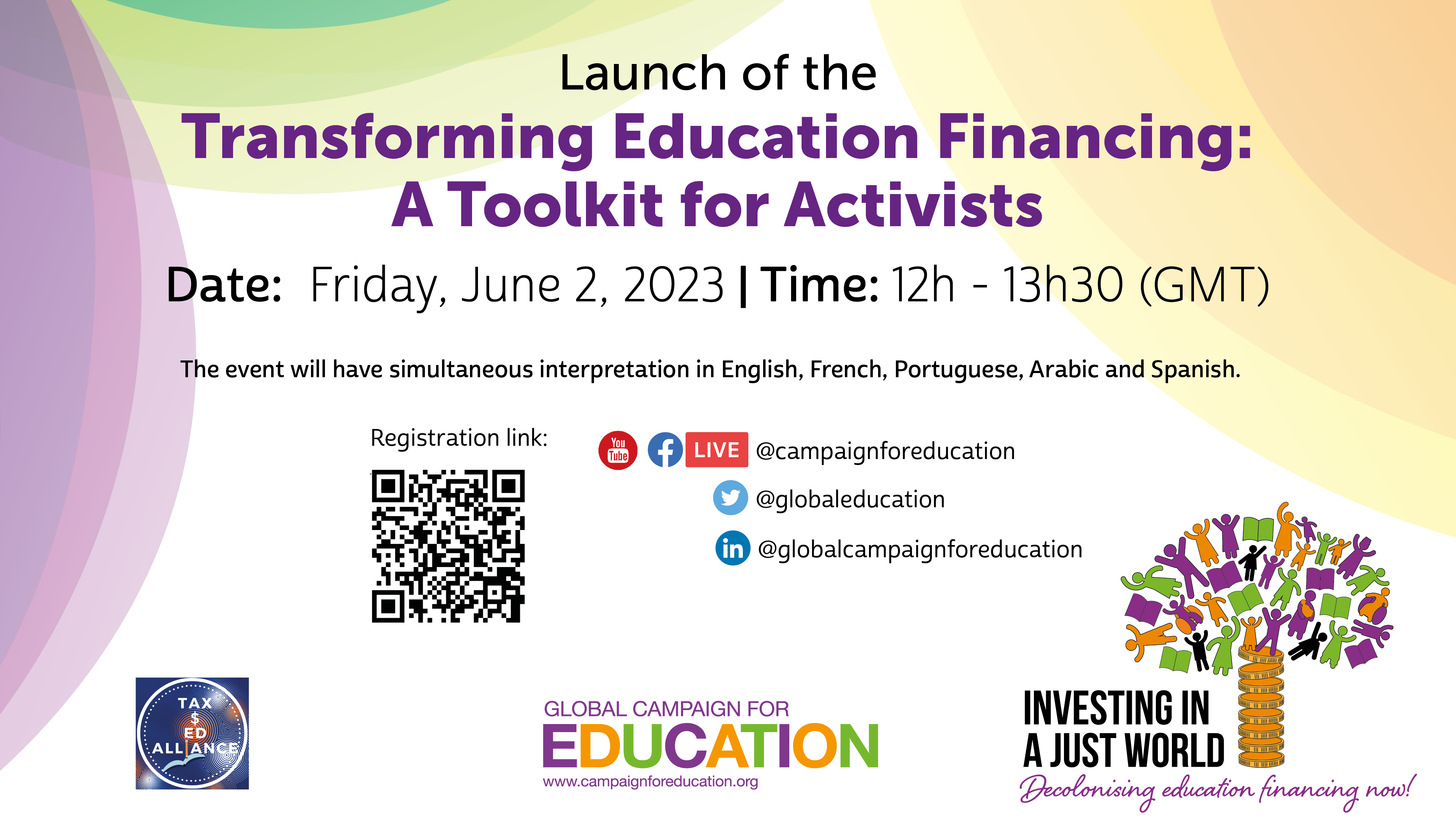
June 2 - Launch of the Transforming Education Financing: A Toolkit for Activists.
🗓️ Date: Friday, June 2, 2023
🕛 Time: 12h - 13h30 (GMT)
🔗 Registration: https://bit.ly/45pvFkx
🧏 The event will have simultaneous interpretation in English, French, Portuguese, Arabic and Spanish.
Thank you in advance for your participation and collaboration to #decoloniseeducationfinancingnow ! #decoloniseeducationfinancing !
Watch the #GAWE2023 Planning Workshop below:


